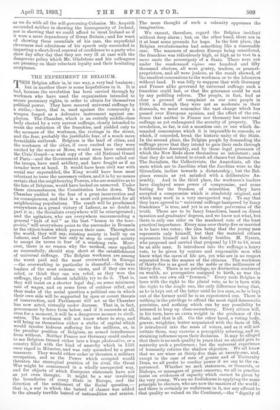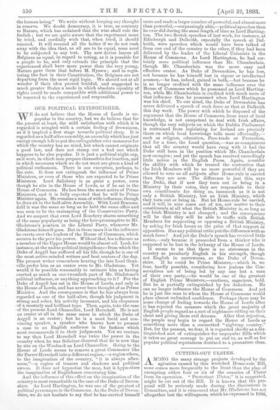THE EXPERIMENT IN BELGIUM.
THIS Belgian affair is, in one way, a very bad business ; but in another there is some hopefulness in it. It is bad, because the revolution has been carried through by workmen who have used the organisation intended to secure pecuniary rights, in order to obtain for themselves political power. They have secured universal suffrage by a strike,—have, that is, used against the community a weapon forged as a defensive instrument against em- ployers. The Chamber, which is an entirely middle-class body elected by a very narrow suffrage, clearly intended to resist the reduction of the franchise, and yielded only to the menaces of the workmen, the riotings in the street, and the fear, probably the justifiable fear, of a much more formidable outbreak. Belgium is the land of cities, and the workmen of the cities, if once excited as they were excited by the scene at Mons, would soon have mastered the Civic Guard—a weak copy of the old National Guard of Paris—and the Government must then have called out i the troops, have used artillery, and have fought as f an invader were at hand. It would have been civil war with social war superadded, the Xing would have been most reluctant to issue the necessary orders, and it is by no means certain that the neighbouring Powers, who are sensitive as to the fate of Belgium, would have looked on unmoved. Under these circumstances, the Constitution broke down. The Chamber yielded to the fear of a great insurrection and its consequences, and that is a most evil precedent for all neighbouring populations. The result will be proclaimed everywhere as a grand victory of Labour, as no doubt in part it is ; the Socialists everywhere will be reinvigorated ; and the agitators, who are everywhere recommending a general "halt of toil" as the best "lesson to the boar- geoisie," will everywhere point to the surrender in Brussels as the object-lesson which proves their ease. Throughout the world, they will say, existing society is built up on Labour, and Labour has only to stop to compel society to accept its terms in fear of a crashing ruin. More- over, there is no reason why the method, once applied so successfully, should stop short at the establishment of universal suffrage. The Belgian workmen are among the worst paid and the most overworked in Europe —the overworking in particular is shameful—they have leaders of the most extreme views, and if they can win relief, or think they can win relief, as they won the suffrage, they will almost infallibly try to do it. ,That is, they will insist on a shorter legal day, on some minimum rate of wages, and on some form of outdoor relief, and thus make of the social question a political one in which their own side will be supported by open or covert threats of insurrection, and Parliament will act as the Chamber has now acted, virtually under duresse. That is, in fact, government by force from below, and if it succeeds at all, even for a moment, it will be a dangerous menace to civili- sation. The workmen will not know where to stop, and will bring themselves either a strike of capital which would involve hideous suffering for the millions, or, in the peculiar position of Belgium, an armed interference from without. Neither France nor Germany could endure to see Belgium turned either into a huge phalanstere, or a country filled with the kind of anarchy which in 1535 i once raged n Munster, and was only quenched by a great massacre. They would either order or threaten a military occupation, and as the Power which occupied would threaten the strategical position of its rival, the Great War might be commenced in a wholly unexpected way, and for objects of which European statesmen have not as yet even thought. It might be a war involving the boundaries of every State in Europe, and the direction of the settlement of the Social question,— that is, a war in which the hatred of classes was added to the already terrible hatred of nationalities and armies. The mere thought of such a calamity oppresses the imagination.
We cannot, therefore, regard the Belgian incident without deep alarm ; but, on the other hand, there are in it at least some grounds for hope. In the first place, the Belgian revolutionaries had something like a reasonable case. The manners of modern Europe being considered, the franchise was ridiculously high, so high as to vest in a mere caste the sovereignty of a State. There were not under the condemned regime one hundred and fifty thousand electors, all were gentry, traders, or peasant- proprietors, and all were jealous, as the result showed, of the smallest concessions to the workmen or to the labourers without land. It was folly to suppose that with Germany and France alike governed by universal suffrage such a franchise could last, or that the grievance could be met by any peddling reform. The people, in fact, had as clear a ground of complaint as our own people in 1830, and though they were not so moderate in their demands, we must remember the vast change which has passed over European opinion, and the effect of the evi- dence that neither in France nor Germany has universal suffrage as yet endangered the security of property. The revolution, so far, is not a senseless one, or one which de- manded concessions which it is impossible to concede, or which, if conceded, break the historic unity of the State. In the second place, the Belgian people by demanding the suffrage prove that they intend to gain their ends through a deliberative Assembly, and by those legal processes of which the New Reds show themselves so intolerant ; and that they do not intend to crush all classes but themselves. The Socialists, the Collectivists, the Anarchists, all the sects which are to Jacobins what the Jacobins were to the Girondists, incline towards a, dictatorship ; but the Bel- gians remain as yet satisfied with a deliberative As- sembly. And in the third place, the workmen's leaders have displayed some power of compromise, and some feeling for the freedom of minorities. They have accepted a compromise which is absolutely original, and which may work in a very unexpected way. To say that they have agreed to " universal suffrage hampered by fancy franchises" is true, and yet is an entire perversion of the truth. There are to be fancy franchises, based on direct taxation and graduates' degrees, and we know not what, but there is only one rider on the manhood vote of the least practical importance, Every man over thirty-five or married is to have two votes ; the idea being that the young man represents only himself, but that the matured citizen represents himself and his family besides. M. Nyssen, who proposed and carried that proposal by 119 to 14, must be an able man. It introduces into the suffrage a heavy vote, to be given by mature and responsible men who know what the cares of life are, yet who are in no respect separated from the masses of the citizens. The workman of thirty-five is as good as the noble or the millionaire of thirty-five. There is no privilege, no distinction conferred on wealth, no prerogative assigned to birth, as was the case with our own old "freemen." Every male Belgian is born with the right to the plural vote, as he is born with the right to the single one, the only difference being that, as he is kept out of the latter until he is a man, so he is kept out of the former until he is an experiented one. There is• nothing in the privilege to offend the most rigid democratic precisian, and nothing which can by any possibility be misused to keep up class-ascendency. Every citizen will, in his turn, have an extra weight in the guidance of the State, and that is all. On the other hand, a voting body, graver, weightier, better acquainted with the facts of life, is introduced into the mass of voters, and as it will not irritate them, may exercise a perceptibly sobering, and re- straining influence upon their decisions. It may be alleged that there is no such quality in years that we should give to maturity such a preference ; but the universal experience of humanity refutes the shallow objection. We all know that we are wiser at thirty-five than at twenty-one, and, except in the case of men of genius and of University Dons, we all prefer to confine power if we can to the ex- perienced. Whether we seek statesmen, or Generals, or Bishops, or managers of great concerns, we all in practice insist on evidences of capacity which cannot be given by i the very young. We see no foolishness n applying the same principle to electors, who are now the masters of the world ; and there is certainly no unfairness in it, nor any affront to that quality so valued on the Continent,—the "dignity of the human being." We write without keeping any thought in reserve. We doubt democracy, it is true, as contrary to Nature, which has ordained that the wise shall rule the foolish ; but we are quite aware that the experiment must be tried, and cordially wish that, when tried, it should succeed. It will succeed all the better if we do not rush away with the idea that, as all are to be equal, none need to be subjected to any test. The new device leaves all Belgians as equal, in regard to voting, as it is possible for a people to be, and only extends the principle that the experienced shall have more power than the very young. Nature gave them that before M. Nyssen ; and in regis- tering the fact in their Constitution, the Belgians are not departing from the most rigid logic. We should not at all wonder if their idea proved fruitful, and suggested to much greater States a mode in which absolute equality of rights could be made compatible with additional power to be reserved to the experienced and responsible.







































 Previous page
Previous page